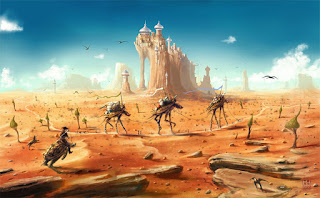The two stories in this issue of Beneath Ceaseless Skies look at politics and conflict and the ethics of action and inaction. Both stories look at complex situation, either global wars or mass uprisings, and how a single person has decisions to make in the face of such violence and uncertainty. And where the first story looks at the power one person can wield to shape events, the second story shows how sometimes the right thing to do is to walk away. These are stories that build vivid settings and populate them with complex characters and situations that live and breathe fantasy. So to the reviews!
 |
| Art by Marek Hlavaty |
Stories:
"The Patchwork Procedure" by Claude Lalumiére (7394 words)
This story takes a look at an alt reality steampunk Earth ripe with political espionage and plots and asks where ethics might be found with them. What is the right thing when regardless of what happens a great many people will die? Lambert Chandler, the adopted son and assassin of a very powerful man, finds himself imprisoned while on the tail of a traitor. Awaiting death, the story slowly reveals the state of the world, still recovering from a Global War and on the brink of another. With nationalism and empire still running wild but things much different from our world. It's a rich setting and cunningly built and shown. The story reveals enough to give a sense of scope and scale and history but doesn't dwell too much on any one event and, once the groundwork is laid, it moves right along. The story is structured as a sort of written story. A confession maybe? Or an explanation? To me it comes across that way because of how Lambert seeks to sort of "come clean" to Reveal all his thoughts and all these truths. It doesn't seem to be written with an audience in mind, more as a way of coming clean with himself. And [SPOILERS!!] the story holds itself back at the last instant from showing what he ultimately decides. It merely gives all the details to that point and then leaves Lambert in that indecision, or in that moment before decision, or decided but before the act itself. It's a wonderful moment of suspense and, while not exactly satisfying in the sense of knowing what happens, it demands that the reader confront what here is the right thing to do. Or perhaps to confront that, here, there is no real right thing to do, that regardless there is death and uncertainly and war. But that there will be action regardless. It's something I haven't seen used too often in short SFF and here I feel that it works, that it makes the story a little deeper, a study of Lambert and a realization that history is sometimes impacted by these actions that could go either way, which does sort of work into the alt history nature of the work, asking what event how far back pushed the setting in its direction and away from our own. It's a fascinating idea and way of framing the story and it's a rather fun and entertaining story. Indeed!
"What Pada-Sara Means to the Elephant" by Jeremy Sim (5812 words)
This is a story about class divides and systemic oppression and hope and freedom. It's set in a world where something like half the population, the bharjana, can create bread from nothing, from shadows and air. And for this, in Tarq, the city that Anu and Shashi are running from, the bharjana are kept basically as slaves. Forced to make bread for the non-magical half of the population. Anu is the main character and desperate to escape after his parents were taken and likely executed for "treason." He's fled with his little sister and is being pursued. The story has a nice touch of strategy to it, Anu matching wits with Jagmeet, the military man chasing him. I love the way the story imagines this struggle playing out, Anu so much smarter and more competent even as a child but expected to help Jagmeet, expected to help all of his oppressors, first because he has no choice and then because they need to be educated, because growing conflict means that the bharjana will not stay oppressed forever. And yet the story shows that the burden of educating the privileged should not fall on those already under their heel. That education needs to be freely given and is not due anyone. It is not owed the privileged that their transition from absolute power to something more equitable be painless. It is certainly not a courtesy they ever extended someone else. [SPOILERS] And so I like that Anu is allowed by the story to just go, to make his own way. To not have to tie himself to the struggle and the work that could be done. He puts a priority on his own life and on his own happiness and on his sister and that's just as valid as going back to try and work for something better in Tarq. Because he's not lost, he's not running away from so much as he's running toward. Toward a future that he can believe in, where he might find someone to view him as an equal instead of the situation with Jagmeet where he will likely never really escape the bounds of prejudice and privilege. The setting of the story is vibrant and alive and yet also isolating, sometimes almost as featureless as the gameboard that Anu plays with. And the way that the pieces move across the land is elegant and balanced, with a touching relationship between Anu and Shashi and a great hope for change, for progress, and for healing. Definitely check out this story!

No comments:
Post a Comment